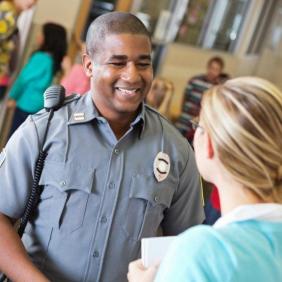By Ben Thomas

As communities wrestle with the best way to keep schools safe, the potential benefit of placing police officers in schools is receiving renewed attention. In fact, many local governments are hurrying to create school-based law enforcement programs, including recruiting retired police officers and even situating community police offices (yes, offices) in schools.
To successfully build and sustain these initiatives, it is essential that communities carefully consider the role of school-based law enforcement, the value of specialized training, and the relationship between the school and the law enforcement agency.
The Role of a School-Based Law Enforcement Officer
The overarching idea behind placing an officer in a school is that he or she can act as a barrier between students and dangerous individuals, particularly armed intruders. However, while it is true that this is an integral role of school-based police, it is only one of the benefits that can be gained from having a well-trained officer working in a school. A school resource officer (SRO)–a law enforcement officer dedicated to a school–can fulfill multiple roles, serving as a law enforcer, educator, and informal counselor.
- Law enforcers: SROs investigate school crimes, devise appropriate responses to juvenile status offenses such as truancy, respond to aggressive behavior, and make arrests as needed. SROs can also help make schools more secure by assessing risks and working with school staff and community emergency services to develop school crisis plans.
- Educators: SROs can serve as guest lecturers, offering specialized instruction on law enforcement-related topics, such as substance abuse, dating violence, and gang resistance. For example, some officers teach evidence-based curricula, including the Olweus Bullying Prevention program and GREAT(Gang Resistance Education and Training). SROs also instruct school staff and parents by providing in-service trainings and offering information on specialized topics, such as cyberbullying and the signs of gang involvement.
- Informal counselors: By fostering relationships and building trust with students, SROs can offer informal guidance on a variety of topics, such as underage drinking, stressful life situations, even the legality of senior pranks. Given their unique relationship with students, SROs are well-positioned to identify issues early and to intervene in collaboration with school staff and families. An SRO can refer a student to the appropriate resource person, such as a mental health counselor, to get the student needed help—and possibly divert the student from involvement with the juvenile justice system.
The Value of Specialized Training
To fulfill these roles effectively, SROs can benefit from specialized training. A Department of Justice report on 28 SRO programs found that inadequately trained SROs were unproductive due to being uncertain in their roles and unequipped to effectively address the responsibilities of the position, particularly around teaching, mentoring, and the scope of their authority. As Mo Canady, Executive Director of the National Association of School Resource Officers, recently explained after testifying at a U.S. House Education & the Workforce Committee hearing on school safety, “Placing police officers in schools without specific training will not work. Schools must have a plan, and the best plans include properly trained law enforcement officers.”
Specialized training programs provide SROs with a number of key skills:
- Developing lesson plans and teaching students
- Understanding youth psychological development and drawing on this knowledge to engage students
- Collaborating with school personnel to find alternatives to suspensions and expulsions
- Navigating the legal and social complexities of working in a school environment
Integrating SROs into the School Environment
Before embarking on a comprehensive school-based law enforcement initiative, schools and law enforcement agencies should take the time to formally identify and define the responsibilities of SROs. These duties should then be outlined in a contract or a Memorandum of Understanding (MOU) that is tailored to meet the community’s goals and serve both the school’s and the law enforcement agency’s needs.
For Further Reading
For more information on SROs, we recommend the following resources:
- A Guide for Developing, Maintaining, and Succeeding with Your School Resource Office Program
- A Day in the Life of a School Resource Officer
- Developing Safe Schools Partnerships: Spotlight on Law Enforcement
- Sustaining the SRO Position in Tough Financial Times
Your Turn
Do you have an SRO program in your school or are you thinking of starting one? What training have you considered? Please post your thoughts and comments below.*
* E-mail addresses will be kept confidential.
Don’t miss out—sign up here to receive our blog, Promote Prevent Perspectives, in a weekly email!